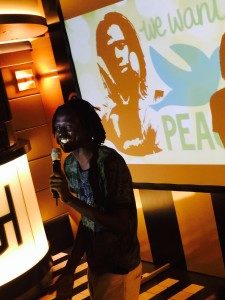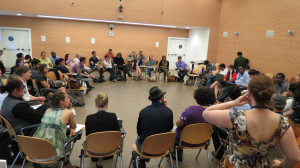by Elinah Nciizah, Zimbabwe
We are in our last week at the IPSI 2014 Bologna Symposium yet every day is a first-hand discovery of shared thoughts, ideas, knowledge and practice. Certainly, learning at the 2014 IPSI Bologna Symposium never ends! The 23rd of July was a day packed full with profound and insightful learning from Dr. Rosoux from the Belgian National Fund for Scientific Research (NFSR) and a Professor of International Negotiation at UCL. She discussed the meaning, scope, and limitations of reconciliation. Meeting Dr. Rosoux released a rich and indulgent understanding on issues of reconciliation and peacebuilding.
When asked to define the term ‘reconciliation’ virtually everyone had something to say in just a word or sentence. Forgiveness, healing, apologies, justice, agreement, re-humanization, co-existence were all shared – of course- among other terms! It became an enormous task to come up with a single definition as the term encompasses several aspects that people felt should be included. Indeed, reconciliation is a complex term and process which makes it difficult to reach a group consensus pertaining to its definition.
We all came to perceive reconciliation as an over-arching process which includes the search for truth,  justice, trust, understanding, forgiveness and healing among other issues. At its simplest, we came to appreciate it as an approach about finding some means to live alongside former enemies. To me this seemed impracticable. Later, I realized that reconciliation does not necessarily mean that you need to love your enemies, or forgive them, or forget the past in any way. Phew! That seems much healthier!
justice, trust, understanding, forgiveness and healing among other issues. At its simplest, we came to appreciate it as an approach about finding some means to live alongside former enemies. To me this seemed impracticable. Later, I realized that reconciliation does not necessarily mean that you need to love your enemies, or forgive them, or forget the past in any way. Phew! That seems much healthier!
What is required is to promote some form of coexistence with former enemies, so as to develop the degree of cooperation necessary to share society with them. It is a supremely difficult challenge to heal the wounds and divisions of a society in the aftermath of sustained violence. This entails revisiting the past, acknowledging the past and understanding the past. Bringing all these three aspects together is the best way to minimize the re-occurrence of a violent conflict in the future.
Coming from Africa where conflicts have been widespread, reconciliation to me appeared to be an enormous task that is too complicated to accomplish. Take, for instance, the Rwandan genocide, the Angolan civil war, the Liberian conflict among others. All these conflicts involved dreadful human rights abuses and violations. Bringing warring parties together, especially your past enemies whom you entirely blame and whom you regard as responsible for the loss of your loved ones, becomes something next to impossibility. Throughout the session, questions queued up in my mind: how can you forgive someone who has raped you? How can you forgive someone who murdered your brothers and your sisters? How can you merely forget the past? Is the past really past?
Such questions made me perceive reconciliation as a difficult mission to pursue. Reconciling with your enemies is not a guarantee that your lost ones are coming back. So what advantages are there that makes reconciliation necessary? How can you reconcile with your enemies when you know that it will never bring back what you have drastically lost? Dr. Rosoux touched on all these crucial aspects.
I came to understand that memory has a significant role to play in reconciliation issues. There is a thin line between the memory and the past. The way we comprehend the past in our memory makes us who we are and determines whether reconciliation will effectively take place. And memories are a significant factor in reconstructing the past. Memories and narratives play a crucial role in a society heading towards reconciliation and contributes intrinsically to how many people are likely to forget the past. Certainly the past must be addressed in order to reach the future. The past is difficult to forget and will remain a challenging issue. But, if we fail to work on the past we should at least try to work on the present in order to open the door for the future.
Participants came to see reconciliation as a necessary component of post-conflict reconstruction. The result depends on the way in which we are able to cope with the past. This reminded me of David Bloomfield when he pointed out that: “It is impossible for many to forget the suffering that has been inflicted in the course of the conflict. On the contrary, in order to move ahead, it is often crucial to put the past aside. Reconciliation becomes a very long and painful journey, addressing the pain and suffering of the victims, understanding the motivations of offenders, bringing together estranged communities, trying to find a path to justice, truth and, ultimately, peace.”
All the same, in the aftermath of an intractable conflict I still found it difficult for one to forget the death of brothers and sisters. If only memories could be erased then the past will really be past!!! If only the past is really past then undoubtedly reconciliation will be a powerful weapon for conflict reconstruction.


